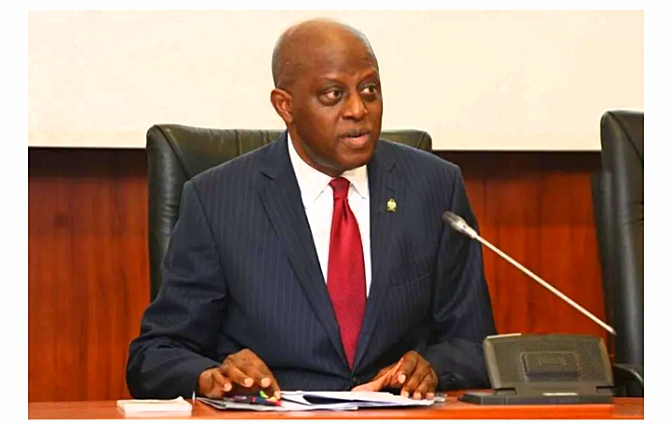
Cardoso speaks on shift in Fx reserves, Naira defence
‘The shift you see in the reserve has nothing to do with defending the naira and that’s certainly not our objective,” he said.
The Central Bank of Nigeria on Wednesday said the shift in Nigeria’s foreign reserves has nothing to do with the apex bank’s defence of the local currency.
The CBN Governor, Olayemi Cardoso, said this on Wednesday at the spring meetings of the International Monetary Fund and World Bank in Washington.
Nigeria’s foreign exchange reserves dipped by about $2.16 billion recently, at $32.29 billion as of 15 April. The development comes amid significant appreciation in the value of the Naira against the US dollar.
The local currency appreciated from a low of about N1,900/$1 earlier in the year to a high of about N1,200/$1, on average, across foreign exchange markets.
Recently, media reports claimed that the central bank may be using Nigeria’s foreign reserves to support the Naira despite earlier promises to allow the currency to float.
Addressing the concerns on Wednesday, Mr Cardoso explained that the movement of the reserves has nothing to do with the recent gains recorded by the Nigerian unit in the forex market, noting that the apex bank had no intention of defending the Naira.
“It is not in our intention to defend the naira, and much as I have read in the recent few days, some opinions concerning what is happening with our reserves and the CBN defending the naira.
“If you think back to what our overall policy and philosophy has been here, you can see it’s counterintuitive.
“The shift you see in the reserve has nothing to do with defending the naira, and that’s certainly not our objective,” he said.
He likened the shift to a common occurrence in any country’s reserve management, adding that such shifts often occur when debts are due or certain payments need to be made to maintain the country’s credibility.
He hinted at a future where CBN interventions would be uncommon, except in highly unusual circumstances.
“Basically what we are encouraging is for the market to have willing buyers and willing sellers for price discovery, and ultimately, I perceive a future where CBN will not need to intervene, except in very, very unusual circumstances,” Mr Cardoso said.
Mr Cardoso emphasised the need for a strong currency market, suggesting that CBN intervention might not be needed if there is enough liquidity in the Fx market.
InterventionThe CBN in recent times has taken several measures to stabilise the FX market, regulate the activities of participants, and increase transparency in the markets.
The bank in March announced it had cleared all ‘valid’ foreign exchange backlogs majorly to restore confidence in the Nigerian economy.
The CBN also removed the +/- 2.5 percent rate on the NAFEX rate for International Money Transfer Organisations (IMTOs) and issued specific guidelines on IMTO services, including minimum capital requirements and prompt repatriation of export proceeds.
It equally directed all banks to stop the use of foreign currency as collateral for Naira loans and reviewed the Cash Reserve Ratio (CRR) framework.
Within the period, the local unit has appreciated significantly against the greenback and is rated one of the best-performing currencies around the world.
The appreciation in the value of the local unit, amounting to 12 per cent against the dollar in April and following a 14 per cent rise in March, is attributed to capital inflows, interest rate hikes, and the CBN’s market reforms.
